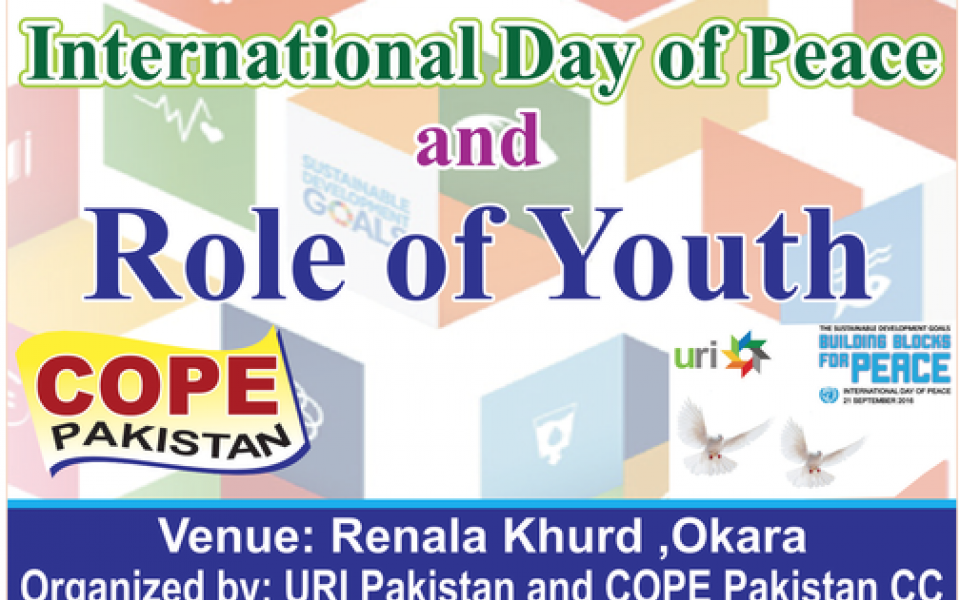
URI Pakistan and COPE Pakistan Cooperation Circle organized training for interfaith youth on the International Day of Peace with an event titled “International Day of Peace and the Role of Youth.” The venue of this training was in Renala Khurd Okara. Ms. Tasneem Saeed, Youth Trainer for URI Pakistan, was the resource person for this training. We invited interfaith youth, children, women, and religious and political leaders from different religions. They participated and talked on peace and the role of youth. In this training, Ms. Tasneem highlighted and talked about the UN Sustainable Development Goals. She shared how we can work together on the UN Sustainable Development Goals “Building Blocks for Peace”.
Cooperation Circle COPE Pakistan wants to create positive thinking between the communities of different religions through sharing and work together for the promotion of Peace. Together, we want to promote peace and interfaith harmony among different religious in Pakistan. We want to share Love, Respect, Tolerance and Honor with other people and spread the message of Peace with interfaith youth.
This program was held on 20th September, 2016 in Renala Khurd Okara and was attended by approximately fifty people. The program aimed to inform the United Nation’s ‘Sustainable Development Goals’. There are seventeen goals of the UN which are time-bound and are to be achieved by 2030. These goals mainly ask governments to take steps to end poverty, eliminate hunger and increase enrolment in schools for children, etc.
The program started with a prayer from the Bible, then Mr. Asher Nazir, Coordinator of COPE Pakistan Cooperation Circle, welcomed all the participants. He also invited a group to sing a peace song called “Nagmay Aman Kay Gayan.” Mr. Nadeem, a local resident, was invited to speak. He said, “Today we don’t have peace within the family unit because of which people are not prospering. The need of the hour is to show self-restraint and promote brotherly relations. Also, we can only have peace if we are united.”
Mr. Imran, a member of COPE Pakistan Cooperation Circle, said, “We should not let Satan do its work and divide us.” After this, Ms. Tasneem Saeed, Youth Trainer for URI Pakistan, was invited to talk about each of the Sustainable Development Goals of the UN and the efforts that have been made globally towards achieving these goals. In Pakistan, however, there is still a long way to go, as 29.5% of its population still lives below the poverty line and earns $1 or 100 rupees a day. Looking at achieving the Zero Hunger goal, according to the World Food Organization, 24% of the people in Pakistan are under-nourished. Also most recent statistics by FAO show that 37.5 million people in Pakistan are not receiving proper nourishment. This malnutrition leads to low levels of productivity.
Pakistan’s spending on health was 0.7% to 0.9% of the Gross Domestic Product. Also according to a World Bank Report in 2013, the spending on health was 1% of the GDP. In imparting quality education, Pakistan’s education standard is the lowest in South Asia. Pakistan’s literacy rate is 58%, which has improved from 35% in 1990-1991.
However, 24 million children are still out of school in Pakistan, according to the Public Financing and Agenda for Education 2016-17 reports. In terms of gender equality, women consist of 50% of the population and, according to an annual gender gap index by the Geneva-based World Economic Forum, in 2014 Pakistan ranked 141 out of 142 countries. In providing energy in Pakistan, there is a shortfall of 5000 megawatts. In cities like Islamabad and Lahore, there are power cuts of more than 6 hours a day in the provision, and in rural areas, it can be 8-10 hours a day. In the provision of clean water and sanitation, according to the World Health Organization’s report, 64% of the population in Pakistan have now access to sanitation as compared to 24% in 1990. However, 3 million Pakistanis are still infected by water-borne diseases.
The situation of meeting the rest of the goals is also quite weak and there is a lot to be desired. In the end, the participants were asked what they can do towards sustainable development, to which one participant answered that they “will now not discriminate against their girl child and give her equal opportunities.”
Mr. Asher Nazir asked some questions to participants about how they would work on these goals in their society and community. In the last of the training, Mr. Asher Nazir thanked all participants and gave special thanks to Ms. Tasneem Saeed for this wonderful training, and detailed information about the United Nation’s ‘Sustainable Development Goals’ with the theme Building Blocks for Peace
See more ways the URI community celebrated the International Day of Peace 2016.
